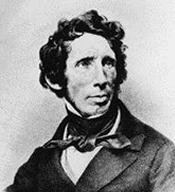| Wöhler
began his chemistry in a small home laboratory. While studying
medicine he continued his chemical
experiments and, after earning
a degree in medicine, Wöhler became a student in Berzelius's laboratory.
A few years later he became professor of chemistry at Göttingen,
Germany, where he remained the rest of his life. He was mainly
an inorganic
chemist (3) but
one of his greatest achievements was the laboratory synthesis of urea in
1828. The artificial synthesis of an organic compound was a major
blow to
the principle of vitalism.
Wöhler and Liebig had a remarkable friendship given the difference
in their temperaments. Wöhler was a modest and gentle man; Liebig
a contentious one. They often worked together on projects.
|
 |
|
|

